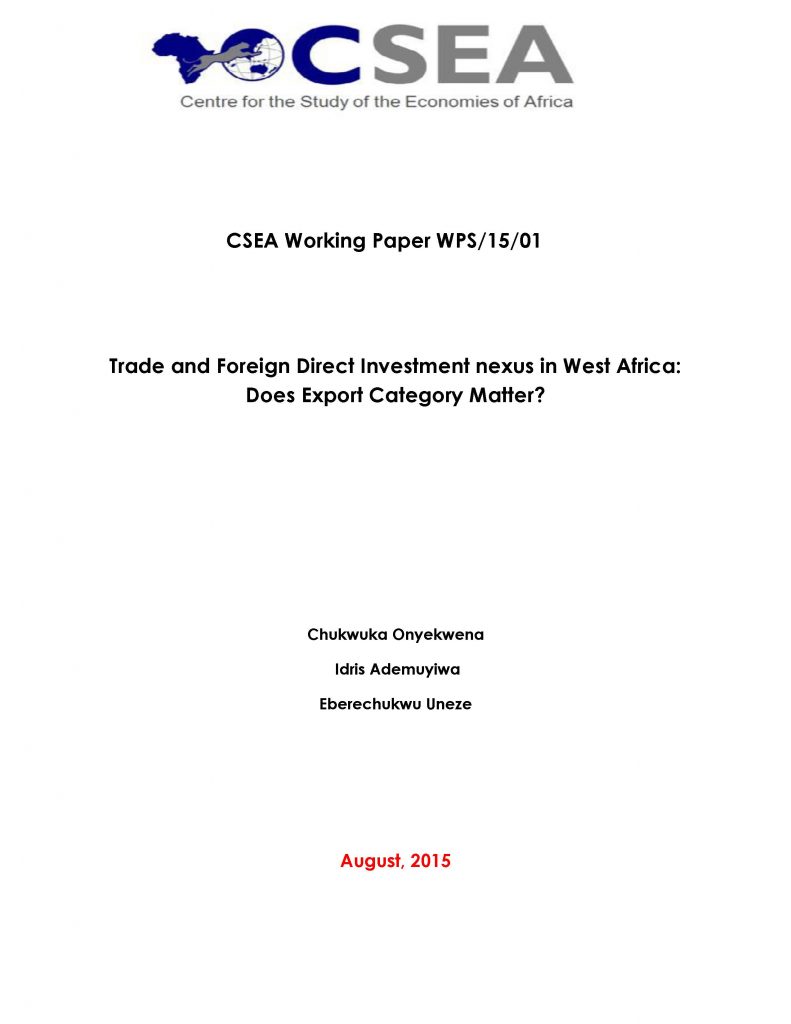Trade and Foreign Direct Investments are the key
divers of economic integration and the globalization process. The widely held
view is that both trade and FDI are beneficial, as the former can stimulate
innovation, productivity, competitiveness, and diversification; and the latter
increases the capital stock, provides new job opportunities, and promotes the
transfer of technology. Thus there have been profound calls within
international organizations for developing countries to encourage both trade
and FDI in order achieve robust economic growth and development. However, critics argue that trade, particularly imports, can
create undue competition and stifle indigenous manufacturing; and inward FDI
can also displace domestic firms. Similarly, from a source country perspective,
outward FDI can lead to loss of jobs as multinationals move job opportunities
overseas
Publications

January 22, 2016
Trade And Foreign Direct Investment Nexus In West Africa: Does Export Category Matter?
This paper examines the effect of inward FDI in
West Africa on exports to EU countries. It investigates from a host country
perspective, the impact of FDI on different export categories: primary,
intermediate, and final goods.
Read →
Related
Nigeria Economic Update (Issue 43)
Crude oil prices have sustained upward increases for the past few weeks in October. While upward trajectory of crude oil prices is expected to be sustained in the short term in line with OPECs production cuts deal expected to run until March 2018, it is important to note that crude oil prices would remain volatile. The Nigerian government therefore should take advantage of periods of high revenue from crude oil exports to develop other sectors (such as Agriculture, Manufacturing and Services sectors) of the economy as key exporting and revenue generation sectors, and thus minimize volatility risks
Nigeria Economic Update (Issue 9)
The naira depreciated by 8.2 percent from
N305/$ on February 5th, to N330/ $ on February 12th 20166. The apex body identified the
increased domestic demand for forex to pay for foreign medical treatments and
schools fees (15 percent of total demand) 7 as the main drivers. As
a result, the apex bank is considering to discontinue the provision of forex for
payment of medical bills and school fees abroad and to re-channel the forex
towards the manufacturing sector of the economy. With the continuous
depreciation of the naira, and the CBNs resistance from calls to devalue the
currency, the options for alternatives measures seem to be diminishing.
Nigeria Economic Update (Issue 7)
Recent domestic Crude oil statistics from the Nigerian National Petroleum Corporation (NNPC), reveals an increase in total crude oil export sales in December 2016. Relative to November 2016, total export sales of crude oil rose from $166.18 million to $195.40 million in December 2016 representing 17.6 percentage (Month-on-Month) increase. The increase is attributable to a rise in crude oil production following a drastic (Year-on-Year) reduction in pipeline vandalism in the preceding month. Given that improvement in oil revenue is critical to fiscal sustainability and external balance, intensified efforts should be implemented towards the maintenance and sustainability of peace in the Niger Delta Region.
